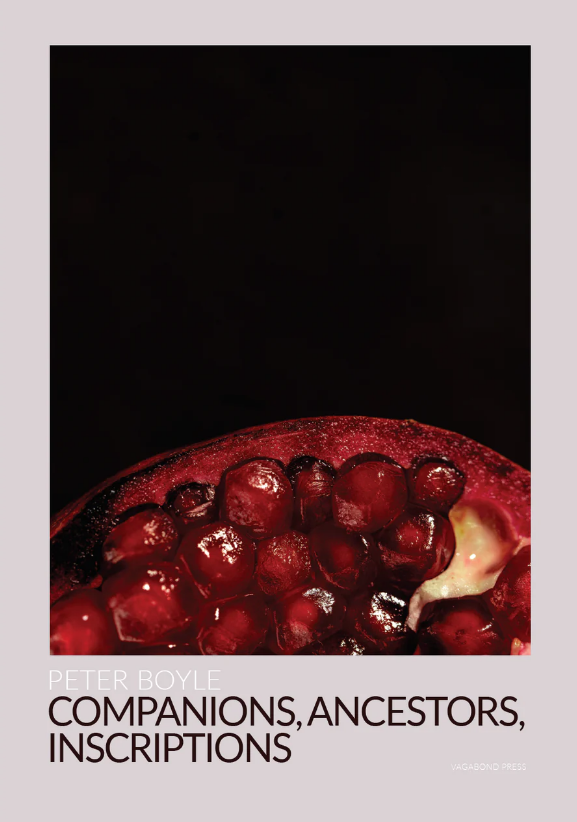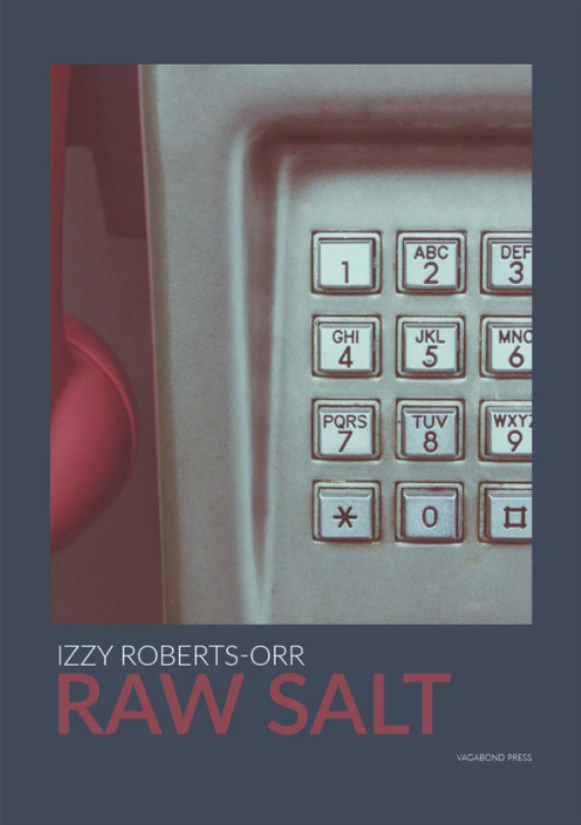
 Companions, Ancestors, Inscriptions by Peter Boyle
Companions, Ancestors, Inscriptions by Peter Boyle
Vagabond Press, 2024
Raw Salt by Izzy Roberts-Orr
Vagabond Press, 2024
First, I salute Vagabond Press – its progenitors, its long-time toilers in the vineyard of poetry, its patrons, its cheer squad, and those who work in the shadows. Any small press, surely, is a hub of more-or-less willing volunteers. It is very expensive, in all sorts of ways, to make a book. Count the cost. But year after year after year, since 1999, Vagabond Press has been turning aside from the multifarious, ever-present griefs of the world, and privileging poetry.
I have been very taken with their broad church doctrine, their capacious mother hen wings, year after year, such a piquant, delicious mix. Even if I haven’t read everything they have published. Because, after all, you can’t read everything. You can fully intend to get around to it and yet somehow you just don’t. So, I seized upon the chance to do the close reading, that a review requires, of Peter Boyle’s Companions, Ancestors, Inscriptions (2024). Because I remember very well his first book, Coming Home from the World, published by Five Islands Press in 1994, that, in spite of being a very slim volume, won the Kenneth Slessor Prize for Poetry in 1995. It is still on my bookshelf, although I do frequent and vigorous culls because you can’t keep everything. Coming Home from the World resonated with a confident, charming ease and skill. This poet seemed to have skipped the apprenticeship stage. It was an impressive debut. But somehow or other, the years have flashed by, and I have read none of his subsequent and numerous books. I can hardly understand myself.
So — taking the title as my lodestar — Companions (those who travel with me), Ancestors (those who came before). Inscriptions (what I etch into stone for all the reasons why anybody might undertake this work) — I opened the book and started reading. Instantly, I was very taken with the authoritative, plangent beauty of the first suite of poems, ‘Five Companions’ (9-11). I recognised the voice of the poet, it is the same voice that lifted up off the pages of that first book. But now it is graver, wiser, sadder, as is only to be expected — but also, suddenly, mischievous. For instance, the poet moves from cosmic sententiousness — from ‘Five Companions 2. Raindrops,’
I am wearing a necklace of raindrops, more judiciously rounded than teardrops, moulded into shape by the greater gravity of earth and the sky’s overburdened need for equanimity. (9)
— to something more impish (and perhaps informed by William Carlos William’s plums in the icebox) — from ‘Five Companions 3. What is lacking,’
As if assailed by doubt water suddenly lost its ability to move. It stares at us forlornly from the upper shelf of the refrigerator. Addicted to my own thoughts, unable to hold onto my own molecules, I do not have the immortality of water. (10)
The initiating image is so precisely placed and vivid, and the punchline comes swinging in with all the weary chutzpah of a butterfly that stings like a bee, so that I winced first, and then chuckled. An elder person’s jokes are the best jokes. They have a sting in the tail.
It is often said that the voice loses upper and lower registers as one ages. But, within this book, I sensed, yes, a slowing, but also an enlarging — of range, and of intent. It is brimming with clarity and reach. The notes that are summoned and pitched could make crystal ring, could strike into dusty corners and make cobwebs tremble. And cobwebs feature several times. They are, after all, a necessary part of the domestic ecosystem. And of the poet’s iconography. The device that the spider constructs — the web — advances into the territory of metaphor. The book begins with a small spider boldly taking up space. From ‘Five Companions 1. Small Spider,’
Next to the strawberries I am cutting on the kitchen counter you step out intent on exploring the world. (9)
And then, in ‘Five Companions 4. My Distant Brother,’ the light that steps inside the poet’s house “turns firm and resolute, holding the scratch marks and spider webs of my east-facing windows in a steady embrace” (10). And then the spiders are revealed as essential backdrop to the poet’s attempts to spin poetry. From ‘379,000 Poets Available,’
At every instant 379,000 fresh attempts to make hope more hopeful, to put more shudder into sadness, to dust clean while also preserving the webs the spiders weave over our windows, to fine tune all the colours of the world and surreptitiously pour a little more sky into blue. (114)
Peter Boyle asserts in ‘Part 3. Time’s Errata’ that “‘[o]nly in the dark are you free.’” (67). And, to extend the metaphor, almost to breaking point, when he resorts to dreams, frequently, they are as sticky as cobwebs and strangely entangling and entrancing. It took me some time, and a bit of head-shaking, to understand that we were wandering in the lucid surrealism of the dreamscape. Henry James is supposed to have stated, “tell a dream, lose a reader.” Perhaps that is often true. But not in the hands of this poet. From ‘The Continuous Concert,’
My invitation card was
distinct: Return concert by acclaimed young pianist, 6 pm sharp,
The meadows beyond the river. Here I was on time, yet there
was no pianist and I was the only audience.
*
It is dark now — the stars are out. I am still waiting
patiently. And slowly a great peace has settled over me,
steadily shaping a curve to the silence, almost a melody. Did
I truly need another’s fingers to interpret this?
And meanwhile, across the keyboard of darkness, a
river was flowing by with my life on it.
(88)
Although there is an elegiac air permeating this book, it is by no manner of means any sort of farewell. Instead, there is a stocky, stubborn shouldering of fate, a resolute taking up of space. An implacable, almost mournful, acceptance of the-way-things-are, with an aftertaste of defiance. From ‘Inscriptions 6,’
The tree has put down its roots. The sky will have to get used to it. (119)









